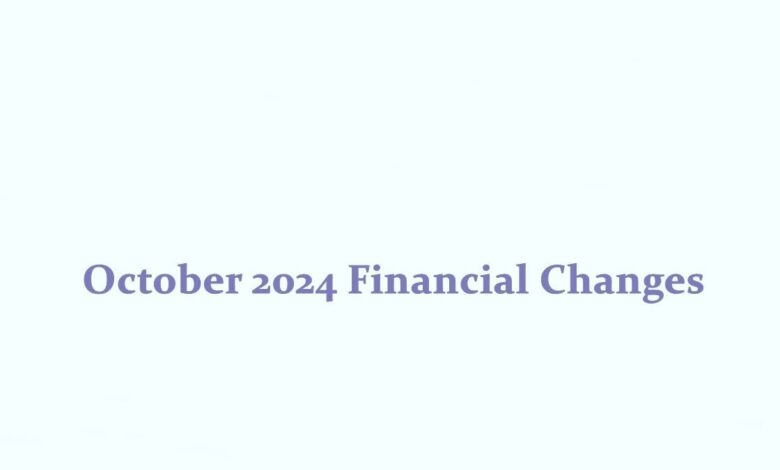October 2024 Brings a Wave of Financial Reforms, Check Key Updates You Need to Know

As we step into October, several significant changes in the financial sector are set to take effect, directly impacting savings schemes, insurance policies, mutual fund taxation, and more. These updates, driven by regulatory bodies and the government, aim to enhance transparency, simplify processes, and offer better terms for investors and policyholders. Let’s take a closer look at the critical changes you should be aware of as they roll out this month.
1. PPF and Small Savings Scheme Reforms
The government has made important changes to post office savings schemes, especially for Public Provident Fund (PPF) account holders. Guardians can no longer open multiple PPF accounts for minors—only one account per minor is allowed. This change aims to prevent misuse of the scheme. In cases where multiple accounts have been opened, the additional accounts will now be considered irregular and will earn a lower interest rate of 4%, compared to the regular 7.1%, until the minor reaches adulthood.
For NRIs who hold PPF accounts, October 1 marks a significant shift. Accounts held by NRIs will stop earning interest from this date, putting an end to investments made under their previous resident status.
2. Improved Loan Transparency with Key Facts Statement
Borrowers seeking retail loans will soon experience greater transparency, thanks to the introduction of the Key Facts Statement (KFS). Starting October 1, all banks and NBFCs will be required to provide this document to borrowers, outlining all loan-related charges, fees, and terms in clear and straightforward language. This measure from the Reserve Bank of India (RBI) is intended to eliminate hidden costs and ensure borrowers have a complete understanding of the financial commitment they are entering into.
3. Health Insurance Upgrades: Shorter Waiting Periods
Health insurance policyholders will also see positive changes. Under the updated IRDAI regulations, the waiting period for pre-existing diseases has been reduced from four years to three years. Additionally, the moratorium period—after which insurance claims cannot be contested except for fraud—has been shortened to five years, from the previous eight years. These changes will be automatically applied when policies are renewed, benefiting policyholders with quicker access to claim benefits.
4. Higher Surrender Values for Endowment Policies
In an effort to protect policyholders, IRDAI has made changes to the surrender value structure of life insurance endowment policies. From October 1, if policyholders decide to exit their policies early, they will receive a higher surrender value. Previously, those who exited within the first year received no return on their premiums. Now, a partial refund of the premium is guaranteed, making early exit more financially bearable for policyholders.
5. Mutual Fund Investors Benefit from TDS Waiver
A major relief for mutual fund investors comes in the form of the removal of the 20% TDS on mutual fund unit repurchases. Announced in this year’s Union Budget and taking effect from October 1, this change is aimed at reducing the tax burden on mutual fund investors, allowing them to repurchase units without facing hefty tax deductions at the source.
6. Direct Tax Vivad Se Vishwas Scheme Launches
The government is launching the Direct Tax Vivad Se Vishwas Scheme, 2024, to streamline the resolution of tax disputes. This scheme offers taxpayers an efficient way to settle pending tax litigations, with reduced settlement amounts, particularly for those who submit their declarations before December 31. It’s a significant step in reducing the backlog of tax cases and cutting down on litigation costs for taxpayers.
7. Share Buyback Taxation Revamp
Share buybacks, a popular way for companies to return excess capital to shareholders, will now follow a new tax regime. As of October 1, the tax burden will shift from companies to shareholders. Buyback proceeds will be taxed as dividend income under the investor’s personal tax slab, rather than the earlier capital gains taxation structure. This move will have a direct impact on shareholders, particularly those in higher income tax brackets, and may affect how companies structure their buybacks in the future.
8. Faster Trading for Bonus Issues
Good news for stock market investors: bonus shares issued by companies will now be available for trading much faster. From October 1, the Securities and Exchange Board of India (SEBI) has reduced the time between the record date and the availability of bonus shares for trading from two weeks to just two days. This means that investors will have quicker access to their bonus shares, enhancing liquidity and efficiency in the market.
The new rules and regulations set to come into force in October mark a significant shift in the financial landscape. These reforms are designed to create a more transparent, investor-friendly environment, offering better protection for policyholders, simplifying processes for taxpayers, and easing the financial burden for mutual fund investors. As these changes come into play, it’s important to stay informed and consider how they might affect your financial planning, investments, and policies.
October’s financial reforms are a step toward a more streamlined and transparent system, but they also require individuals and businesses to adjust and respond. Staying up to date with these changes will ensure that you can take full advantage of the benefits they offer.
-The author is Joint Chairman & MD, BajajCapital. Views expressed are personal.
Disclaimer: The views and investment tips by experts in this digihunt.com report are their own and not those of the website or its management. Readers are advised to check with certified experts before making any investment decisions.


